Suchergebnisse
Programme Evaluation of "City of Tomorrow" 2013 - 2021
This evaluation examined the effects that the "City of Tomorrow" programme has achieved since its inception. The evaluation is based on extensive surveys of research project participants and various multipliers from application areas such as civil engineering and urban planning. The evaluation thereby creates an important basis for the design of future research funding.
Energy-Sponge-Bruck (Energieschwamm Bruck an der Mur)
The aim of the exploration-study for the urban region Bruck/Oberaich "Energieschwamm Bruck" or "Energy-Sponge-Bruck" was to establish clear and stringent basics for a flexible development of the future energy system. Therefore an energy development concept as well as a cadaster for short-term implementation measures had been applied. The structured, Bruck-based approach acts as framework for a general energy-conception-method, valid for small and medium urban regions with 10,000 to 20,000 inhabitants.
Highlights of Energy Research 2018 - System Integration and Sector Coupling
March 20th, 2018, 9:00 - 16:30
TUtheSky, Getreidemarkt 9, Vienna
The 11th Highlights of Energy Research will focus on system integration and coupling of sectors. National and IEA research projects in the areas of energy systems and grids, industry, mobility and buildings and urban systems will be presented.
Innovative construction
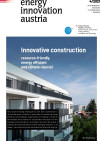
resource-friendly, energy efficient and climate-neutral
energy innovation austria
4/2021
Herausgeber: BMK in cooperation with the Climate and Energy Fund
Englisch, 12 Seiten
Downloads zur Publikation
Spatial Energy Planning for Smart City Quarters and Smart Regions
In the project ERP_hoch3 energy related policy research in three Austrian agglomerations (Vienna – Lower Austria, Graz – Styria and Vorderland-Feldkirch) has been done, scenarios of the current state and the target state have been modelled and calculated. The aim was to develop generic transferable recommendations for spatial energy planning in agglomerations.
Integrated energy systems
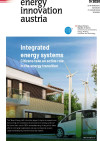
Citizens take an active role in the energy transition
energy innovation austria
3/2020
Herausgeber: BMK in cooperation with the Climate and Energy Fund
Englisch, 12 Seiten
Downloads zur Publikation
Positive energy districts
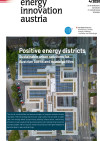
Sustainable urban solutions for Austrian towns and municipalities
energy innovation austria
4/2020
Herausgeber: BMK in cooperation with the Climate and Energy Fund
Englisch, 12 Seiten
Downloads zur Publikation
THERM-opti-BALCONY: Thermal Optimized Renovation of Balconies
Pre-cast cantilever balconies represent a particular problem in the thermal renovation of buildings. The central goal of this project is the development of practical and cost-effective mounting solutions for the thermally decoupled reconstruction of balconies on building frontages and achieving a significant increase in the energy performance of the thermal renovation measure.
HEROES - Houses for Energy- and ResOurce Efficient Settlements
A simplified method will be developed for the calculation of environmental indicators for so far not considered building elements (eg. constructions, which are not thermally relevant and HVAC-components). The theoretical principles for the calculation of the primary energy demand and the CO2-Emissions for operating and raising a building will be harmonized.
LINE-FEED - Plug-in Photovoltaic Storage for the Wall Socket
The project LINE-FEED developed technologies that are required for a photovoltaic storage system which can be installed by anybody by simply plugging it into a wall socket. The aim was to create a storage system for households in urban areas that do not have the possibility to install a photovoltaic system themselves.
Climate-friendly buildings
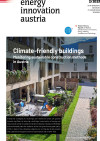
Monitoring sustainable construction methods in Austria
energy innovation austria
2/2023
Herausgeber: BMK in cooperation with the Climate and Energy Fund
Englisch, 12 Seiten
Downloads zur Publikation
Pioneering Austrian Cities
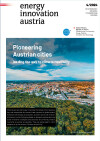
Pioneering Austrian cities leading the way to climate neutrality.
energy innovation austria
4/2024
Herausgeber: BMK in cooperation with the Climate and Energy Fund
Englisch, 12 Seiten
Downloads zur Publikation
BIMaterial Process Design for Material Building Pass
Building Information Modelling supported compilation of a Material Building Pass; as a qualitative and quantitative documentation of the material composition of, and the material distribution within, a building structure. This project is a central milestone towards standardized, BIM-generated building material passes.
smart façade - energy potential of adaptive façade systems
A specially developed simulation model is employed to ascertain the energetic potential of adaptive façade systems. The dynamic behavior of the physical properties of the adaptive façade system reacts to both internal and external changing conditions. The goal was the development of an adaptive façade, which helps provide maximum comfort for the building occupants with minimum energy consumption.
Renewable Heating and Cooling
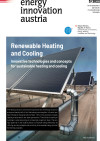
Innovative technologies and concepts for sustainable heating and cooling
energy innovation austria
3/2022
Herausgeber: BMK in cooperation with the Climate and Energy Fund
Englisch, 12 Seiten
Downloads zur Publikation
Workshop: Optimizing PV Self Consumption on a local and regional level
May 6th 2019, 13.00 h
Hotel Allegria, Golfstraße 1, 7551 Stegersbach
This workshop is part of the workshop-series “City of the Future in Practice”, in which practice relevant R&D results of the technology program “City of the Future” were presented and discussed.
SOFC4City - SOFC-waste heat utilization for buildings and industry
In this project the application of a solid oxide fuel cell (SOFC) for energy supply (heat and power) of urban areas will be investigated. Due to the high temperature level of the produced heat it would be possible to use this heat for the energy supply of different heat and power consumers (residential buildings, industrial plants, etc.). One aim is to provide the SOFC-heat at several temperature levels in order to establish the advantages of the fuel cell. On the one hand the legal and market-based conditions will be evaluated, on the other hand the technological feasibility will be scoured by the use of CFD-simulation of the heat production.
SPIN.OFF - Integration of storage systems in the office building Tech2Base
The research project SPIN.OFF was based on the integration of a zinc - bromine redox flow battery storage system within the Tech2Base, a planned office building in Vienna's 21st district. On the basis of this battery demonstration object questions arising with the implementation and operation process can be answered. Besides the ideal dimensioning of the battery storage system and the development of a self-learning energy management system to increase the self-consumption and to reduce load peaks, additional planning and safety related aspects were investigated.
Innovations for energy communities
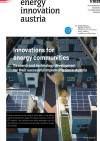
Research and technology development for their successful implementation in Austria
energy innovation austria
1/2023
Herausgeber: BMK in cooperation with the Climate and Energy Fund
Englisch, 12 Seiten
Downloads zur Publikation
scaleFLEX - Scalable method for optimizing the energy flexibility of districts
Development of a decentrally organized automation method for improving the demand-side flexibility options of buildings and districts. The utilized data-driven algorithm promise high scalability and therefore low installation and operating costs. The developed method will be validated using different building types (high-tech office buildings, low-tech office buildings, residential buildings).
